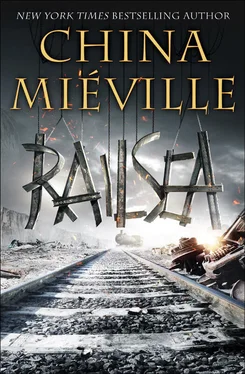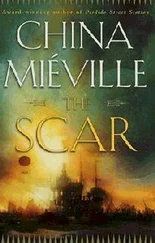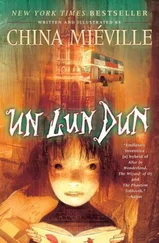So they were heading north, then. Someone was holding Sham down in a chair. He shook & yelled but could not break free. On the table in front of him, someone laid out thick paper. As if to protect the table from spills. Sham yelled again. An officer was slowly unrolling a leather pack containing glittering sharp things.
“I don’t know nothing!” Sham shouted. What ghastly instruments were these? “I told him!”
“Juddamore,” Elfrish said. “Begin.”
The big man took a wicked grey spike from the pack. Licked his thumb & pressed it to the point. Winced his appreciation. Sham screeched. The man lowered it until it pointed at Sham’s face.
“So,” said Elfrish. “You said you found pictures. That would be these.” He held up scraps—the greasy, now-torn & well-worn images that Sham had scribbled for himself, the remembrances of what he had seen on screen. “& culminating in this.” Sham’s cheap little camera. On its screen that single line. Even so small & ill-focused, it hushed the room.
“Know where this leads?” Elfrish whispered. “No. Neither do I. But I am, as you know by now, very much of a one for stories. & such intimations as there are for people to hunt the let-me-stress-it legendary, mythical, obviously-not-at-all-real places beyond, revolve around money. A lot of it. You see my point.
“Oh, people’ll go after those Shroakes. It’s hardly just me. With their train, that won’t go well, I suspect. But followed as they know they are, they’ll wind their route. What I want to do is head them off . Which means knowing where they’re going.
“Now, your well-being is up to you, Sham ap Soorap. These—” He shook the images. “—may make sense to you. To me, not so helpful. To me they are scrawls. So, the things you saw?
“Describe them.”
The man called Juddamore lowered his sharp point to the paper. It was a pencil. He began to draw.

HE TRANSLATED SHAM’S gabbled descriptions into images. Juddamore was talented. Even in his wash of fear & relief, Sham was impressed to watch the pictures emerge from scrawled grey lines as tangled as the railsea.
Someone’ll run come save me , he thought, & described his pictures & memories, in case they did not, in fact. In the days & weeks that he had prepared his trip to Manihiki, formulating his plan, Sham had gone over those images in his mind, leafed through his scrappy redrawings, more than once. They were vivid in his mind.
“& then in the third one there’s, yeah, that one …”
“What is that?” some deep-voiced pirate muttered, staring at Sham’s original. “Is that a bird?”
Sham. Never an artist.
“No, it’s, it’s like, a sort of, a sort of overhang, like, like …” & with frantic hand-motions Sham described the rock angle, & so on. To stay alive. Juddamore drew what he described, & Sham would pass comment & correct him like some lunatically agitated critic. “Not like that, the little forest was a bit more, lower trees, like …”
Each of these scenes had originally been chosen & frozen because it was a sight, after all. Each of them had some quality, some feature, something to distinguish it from the everyday railsea, to make it worth recording. For hours, Juddamore drew pictures of descriptions of memories of glimpses of digital images of sights once long ago seen. The pirate officers looked, heads cocked, rubbing their chins. Debated what they saw.
“& this is the order?”
“Look. That bit there sounds like the corner off the coast of Norwest Peace.”
“There’s rumours about rail shenanigans up Kammy Hammy way, & couldn’t that be the cut in the mountains that gets you up by its western islands?”
They traced a route. With maps beside them, they ruminated. Over a long time, guessing where they had to, putting to one side controversies, the best brains of the pirate train reconstructed a dead explorers’ route. Until, astoundingly, they had decided they knew—more or less, roughly, in broad sweeps—where they were going.
This is not what I ever had in mind , Sham thought. I ain’t even a pirate. I’m a pirate-abetter .
BUT WAIT. STUDENTS OF THE RAILSEA, OF COURSE YOU have questions. You are likely to narrow in on uncertain & mysterious questions of iron-rail theology.
You wish to know which is the oldest civilisation in the railsea, which island state’s records go back furthest, using which calendar? What do they tell us about the history of the world, the Lunchtime Ages, prehistory, the times before the scattered debris from offhand offworld picnicking visitors was added to aeons of salvage? Is it true the upsky used to be full of the same birds as now fly the down? & if so, what was the point of that?
What of the decline & fall of empires? Human empires & godly ones? & what about those gods—That Apt Ohm, Mary Ann the Digger, Railhater Beeching, all that brood? What, above all, about wood ?
That is the key mystery. Wood makes trees trees. Wood is also what makes ties—those bars crosswise between railsea rails—ties. A thing can have only one essence. How can this, then, be?
Of all the philosophers’ answers, three stand out as least unlikely.
—Wood & wood are, in fact, appearances notwithstanding, different things.
—Trees are creations of a devil that delights in confusing us.
—Trees are the ghosts of ties, their gnarled & twisted & dreamlike echoes born when parts of the railsea are damaged & destroyed. Transubstantiated matter.
All other suggestions are deeply eccentric. One of these three is most likely true. Which you believe is up to you.
We have pirates to return to.
GENERALLY IT WAS ROBALSON WHO BROUGHT SHAM his food. It was Robalson who waited around after Elfrish left, on his brief visits to double-check on picture descriptions, that left Sham quivering. “Yeah,” Robalson would say, as if agreeing with whatever terror Elfrish had instilled. He’d twist his face into a sneer, undermined only somewhat by his visible discomfort at Sham’s fear.
One time he came alone, & led Sham upstairs constrained, with his wrists shackled to a belt itself attached to a pole that Robalson held. It was a modern train. Diesel. They were moving faster than the Medes could have. They were on a strip of pondside rail star’d, with quicksand to port, from which muckworms poked bleached eyeless faces.
Sham took stock. You never knew. Seven, no, eight carriages. Two double-decker. Crew everywhere. A conning tower. Not as high as the crow’s nests he was used to, but the telescope jutting from its viewing slit looked powerful. The Tarralesh was not in pursuit, did not fly the notorious skull-&-spanners flag. But it bristled with barrels. From specialised portholes & little holes poked cannons & machine guns. & there was Elfrish. Sham shivered.
“Well?” Elfrish shouted. The captain pointed. Dead ahead a scrappy forest gave way to sand, brick-coloured in the odd light. “Was that what you saw?”
This was why they’d brought him out—not for his comfort, but to verify the landscape. Elfrish & his officers were gathered around Juddamore’s pictures.
Should Sham lie? Tell them to go to airy hell? Tell them this was not the place when—he looked, & oh, it was. He caught his breath. This was the first image he had seen over Captain Naphi’s shoulder. He should lie. Tell them no, you should be somewhere very else. Get them off the Shroakes’ tails?
A rumour & a picture? Sham thought. What kind of crazy person was Elfrish, that that was enough to send him halfway across the railsea, into unknown stretches, on the off chance of who knew what? Evil & cold & terrifying & all that he might be, but Elfrish never seemed crazy—
Читать дальше













